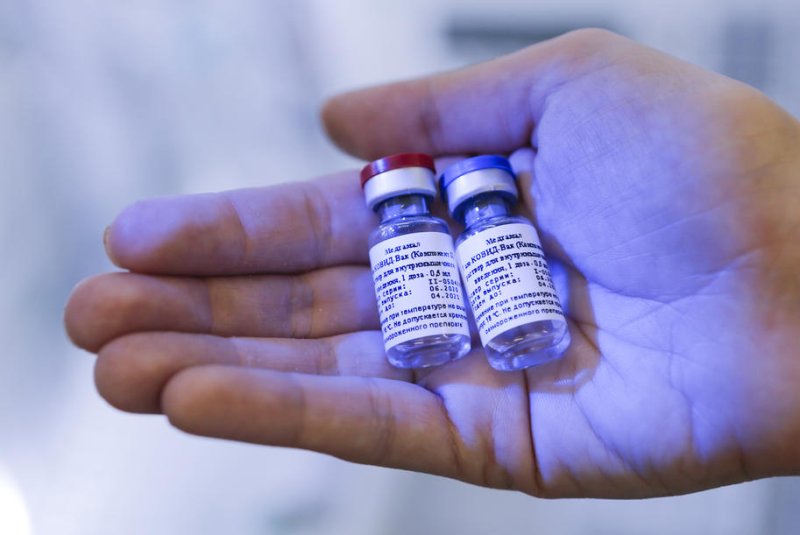
Vials of Russia's "Sputnik V" COVID-19 vaccine are seen at the Nikolai Gamaleya National Center of Epidemiology and Microbiology in Moscow, Russia, on August 6. File Photo by RDIF/EPA-EFE
Dec. 11 (UPI) -- Drugmaker AstraZeneca will use a component of Russia's "Sputnik V" COVID-19 vaccine in clinical trials for its vaccine, officials said Friday.
The Russian Direct Investment Fund and the Gamaleya Institute, makers of the Sputnik V vaccine, said AstraZeneca has accepted their offer of a human adenoviral vector -- a common cold virus -- for use in trials for its experimental AZD1222 vaccine.
AstraZeneca, which is developing AZD1222 in partnership with Oxford University, will begin using Sputnik V's human adenoviral vector type Ad26 in clinical trials by the end of the year, according to RFID CEO Kirill Dmitriev.
"The decision by AstraZeneca to carry out clinical trials using one of two vectors of Sputnik V in order to increase its own vaccine's efficacy is an important step towards uniting efforts in the fight against the pandemic," he said in a statement.
"We are determined to develop this partnership in the future and to start joint production after the new vaccine demonstrates its efficacy in the course of clinical trials. We hope that other vaccine producers will follow our example."
AstraZeneca confirmed the collaboration.
"Being able to combine different COVID-19 vaccines may be helpful to improved protection and/or to improve vaccine accessibility," company officials told CNBC.
RELATED Hackers target regulatory records for Pfizer's COVID-19 vaccine in Europe
"This is why it is important to explore different vaccine combinations to help make immunization programs more flexible, by allowing physicians greater choice at the time of administering vaccines."
RFID -- Russia's sovereign wealth fund -- has claimed the Sputnik V vaccine is more than 90% effective in preventing COVID-19, according to preliminary clinical results.
It is unique for vaccines under development to use two different adenoviral vectors in the first and second doses to avoid immunity to the first vector.
RELATED Canada joins Britain in approving Pfizer's COVID-19 vaccine
The AstraZeneca-Oxford vaccine, meanwhile, prevents infection in 62% of people who receive two full doses, and in 90% of those given a half dose followed by a full dose, according to interim data published last week.
Friday's announcement follows a recommendation Thursday by the U.S. Food and Drug Administration's vaccines committee to give emergency use authorization in the United States for a vaccine developed jointly by Pfizer and BioNTech.
The move, a key milestone in distributing a vaccine in the United States, is expected to be upheld by the FDA on Friday or Saturday. That would be the final approval for Americans to begin receiving the vaccine, which has proven about 95% effective.
The Pfizer-BioNTech vaccine has already received approval in Britain and Canada. Inoculations began in Britain early this week.
No comments:
Post a Comment